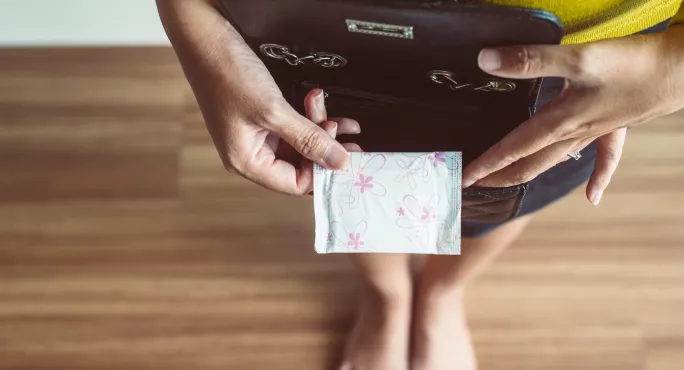Lockdown shows how period leave can work in schools

The Covid-19 pandemic has led to both children and teachers learning a wealth of new skills and approaches to allow learning to continue safely. And in the spirit of that willingness to adapt in ways that benefit those in education, we should also be looking to introduce menstrual leave for school pupils (and, dare I say it, staff).
The idea is only radical until it becomes the normal. There are many compelling and rational reasons why menstrual leave should be the norm. In fact, many countries have been doing this for years.
Indonesia has allowed two days menstrual leave per month since 2003, while forward-thinking Japan first introduced menstrual leave for workers as far back as 1947. In 2016, Bristol company Coexist started a menstrual policy to allow staff flexibility during their period, and manager Bex Baxter told The Independent that “there is a misconception that taking time off makes a business unproductive”.
Period pain: Too many teachers are suffering in silence
Long read: Why period positivity matters for everyone in schools
Quick read: We’re leading the world in tackling period poverty
Period poverty: How to fix the missed issue of lockdown
Quick read: How to end stigma around periods? Put students in charge
Opinion: ‘Periods aren’t shameful - let’s talk about them in school’
Although some progress towards equity has been made -such as free period products in schools (and now all public places) in Scotland, for example - change has come slowly. In 2021, why should it be a problem to allow girls the chance to learn from home, for a day or two (unpenalised), if they need it?
Remote learning opens the door to period leave
Whenever this topic comes up, there is inevitably some debate about the “fairness” of menstrual leave. I say it is time for society to show a little maturity - the world has been unfair on women and girls for centuries.
Expecting people to carry on as normal while in terrible pain is brutally unfair. The menstrual cycle-tracking app Clue reports that three in four people report pain just before or during their period. As teachers, we should understand the unfairness of treating everyone the same. True inclusive education is about equity.
Stigma around periods is still deeply ingrained in our culture. Having been a Primary 6-7 teacher for a few years now, I know that 10-year-old girls have already internalised shame and embarrassment about periods. By the time their puberty lessons come around, they are already anxious and would rather not learn about them at all - it does not matter how positively I try to put it across that periods are a good thing and an indicator of health.
This is cultural conditioning and there is no reason why these deep-rooted messages cannot be unlearned. Many people have an awareness of barbaric practices like “chhaupadi” in some parts of the world, where girls are treated appallingly during their periods, forced to leave their homes and live in huts.
However, it is less well known that many cultures celebrate menarche (the first menstrual period) with celebratory ceremonies. Some indigenous American communities for example, celebrate menarche with a “sunrise ceremony” involving the girl wearing special clothes, participating in rituals and receiving gifts. In Japan, a special family meal is made to celebrate menarche and in Croatia girls are given a glass of red wine.
While it may be some time before wider Western culture embraces such empowering rites of passage, the least we should be doing is making accommodations to allow those who suffer heavy bleeding and pain a chance to rest and access education from home if they are up to it (or even make simple adaptations such as deadline flexibility).
In her book Period Power, women’s health expert Maisie Hill uses the seasons as an analogy to understand the menstrual cycle. She says that the week or so after the period ends is like spring, with energy levels returning. The ovulation phase is like summer, with the hormone interplay bringing confidence and highest energy. The premenstrual phase is like autumn when the drop in testosterone can lead to a dip in mood and lower energy. The first few days of the period is like the middle of winter. It is normal to experience tiredness and a need for more rest than usual. Hill strongly advocates that people should try to get some extra rest during the winter phase, not just because it is needed but because it allows us to make more use of the higher energy phases of the cycle.
Far from railroading teenagers into switching off their menstrual cycles with hormonal contraceptives, we should be educating them on how their cycles work. It can only be beneficial for girls, transgender boys and others to properly understand their cycles and learn to work with them. I echo writer Jessica Powell who recently argued in Tes for improved working conditions for those struggling with menstrual health, especially as the pandemic has shown how flexible we can be.
We have the technology, we have the creativity; the only other thing we need is the will to make changes - and that includes schools.
Gemma Clark is a primary teacher and a master’s student, based in Scotland. She tweets @Gemma_clark14
You need a Tes subscription to read this article
Subscribe now to read this article and get other subscriber-only content:
- Unlimited access to all Tes magazine content
- Exclusive subscriber-only stories
- Award-winning email newsletters
Already a subscriber? Log in
You need a subscription to read this article
Subscribe now to read this article and get other subscriber-only content, including:
- Unlimited access to all Tes magazine content
- Exclusive subscriber-only stories
- Award-winning email newsletters
topics in this article




